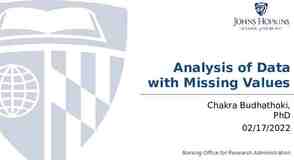CYBERSECURITY AWARENESS MONTH 2023 HOW TO STAY SAFE ONLINE
23 Slides2.84 MB
CYBERSECURITY AWARENESS MONTH 2023 HOW TO STAY SAFE ONLINE
Cybersecurity Awareness Month Launched in 2004 Co-managed by the Cybersecurity and Infrastructure Security Agency (CISA) and the National Cybersecurity Alliance (NCA) Collaborative effort between government and industry to raise cybersecurity awareness Ensures that everyone has the resources they need to be safe and secure online.
October is Cybersecurity Awareness Month
Theme
Overall Campaign Goal Take actionable steps to stay safe online Tone Positive Approachable Simple Back to basics
What is Cybersecurity? Defined as "the protection of computer systems and networks from attacks by malicious actors that may result in unauthorized information disclosure, theft of, or damage to hardware, software, or data." Wherever there is technology, there needs to be cybersecurity.
Why is it Important? Implementing cybersecurity best practices is important for individuals as well as organizations of all sizes to protect personal, financial and sensitive information. For both government and private entities, developing and implementing tailored cybersecurity plans and processes is key to protecting and maintaining business operations.
Feelings Toward Cybersecurity 78% of people consider staying secure online a priority 34% noted they often feel overwhelmed by information and, as a result, minimize their online actions 46% felt frustrated while staying secure online 39% of users trying to keep safe felt information on how to stay secure online is confusing Findings from Oh Behave! The Annual Cybersecurity Attitudes and Behaviors Report 2022
Our Online Behaviors Only 33% of individuals create unique passwords for all accounts Only 18% of individuals have downloaded a password manager 43% of respondents have never heard of multifactor authentication (MFA) Out of the 57% of the participants who had heard about it: 79% applied it at least once and 94% of them reporting that they were still using MFA 92% of respondents took action after a security training 58% say they are better at recognizing phishing 45% started using strong and unique passwords 40% started using MFA 40% started regularly installing software updates Findings from Oh Behave! The Annual Cybersecurity Attitudes and Behaviors Report 2022
4 Easy Ways to Stay Safe Online Use Strong Passwords and a Password Manager Turn on Multifactor Authentication Recognize and Report Phishing Attacks Update Your Software
Use Strong Passwords CREATE STRONG PASSWORDS: Long At least 16 characters Unique NEVER reuse passwords Complex Upper- and lower-case letters Numbers Special characters Spaces
Use a Password Manager WHY USE A PASSWORD MANAGER? Stores your passwords Alerts you of duplicate passwords Generates strong new passwords Some automatically fill your login credentials into website to make sign-in easy Encryption ensures that password managers never "know" what your passwords are, keeping them safe from cyber attacks.
Turn on Multifactor Authentication WHAT IS IT? A code sent to your phone or email An authenticator app A security key Biometrics Fingerprint Facial recognition
Turn on Multifactor Authentication WHERE SHOULD YOU USE MFA? Email Accounts with financial information Ex: Online store Accounts with personal information Ex: Social media
Recognize and Report Phishing PHISHING RED FLAGS: A tone that’s urgent or makes you scared "Click this link immediately or your account will be closed" Bad spellings, bad grammar Requests to send personal info Sender email address doesn’t match the company it’s coming from Ex: Amazon.com vs. Amaz0n.com An email you weren't expecting
Recognize and Report Phishing WHAT TO DO Do NOT Do Don't click any links Verify Don't click any attachments Contact that person directly if it's someone you know Don't send personal info Report it to your IT department or email/phone provider DELETE IT
Update Your Software WHY? Updates ensure your devices and apps are protected from the latest threats Don't click "remind me later", it could leave you vulnerable to cyber threats Automatic updates are the easiest way to stay secure
Update Your Software WHERE TO FIND AVAILABLE UPDATES Check for notifications to your phone or computer Look in your phone, browser or app settings Check the upper corner of your browser for any alerts
Ways to Get Involved AT WORK Publicize resources and activities Intranet Website Promotions Discounts Giveaways Hold a contest Emails to employees/customers AT HOME Phishing simulation Poster contest Share helpful tips and resources Kids Parents Friends Hold a family “tech talk” Discuss how each family member can protect their devices, accounts, and personal information. Create a culture of security in your family
Ways to Get Involved Cont. IN YOUR COMMUNITY Volunteer to teach others in your community Reach out to Your kid's school A library/community center Senior center Place of worship ONLINE Join on the conversation on social media using #CybersecurityAwarenessMonth #SecureOurWorld
Building a Strong Cybersecurity Culture Use basic cybersecurity training. This helps familiarize staff with cybersecurity concepts and activities associated with implementing cybersecurity best practices. Identify available cybersecurity training resources. Cybersecurity training resources—on topics like phishing and good email practices—are available through professional association, educational institutions, as well as private sector and government sources. Stay current on cybersecurity events and incidents. This helps identify lessons learned and helps to maintain vigilance and agility to cybersecurity trends. Encourage employees to make good choices online and learn about risks like phishing and business email compromise.
Additional Resources CISA Cybersecurity Training & Exercises CISA YouTube Channel Report a Cyber Issue Secure by Design NCA Cross-Sector Cybersecurity Performance Go als Resources and Guides Videos and On-Demand Webinars Cyber Resource Hub
Get in Touch CISA cisa.gov/cybersecurity-awareness-month [email protected] NCA staysafeonline.org [email protected]




























